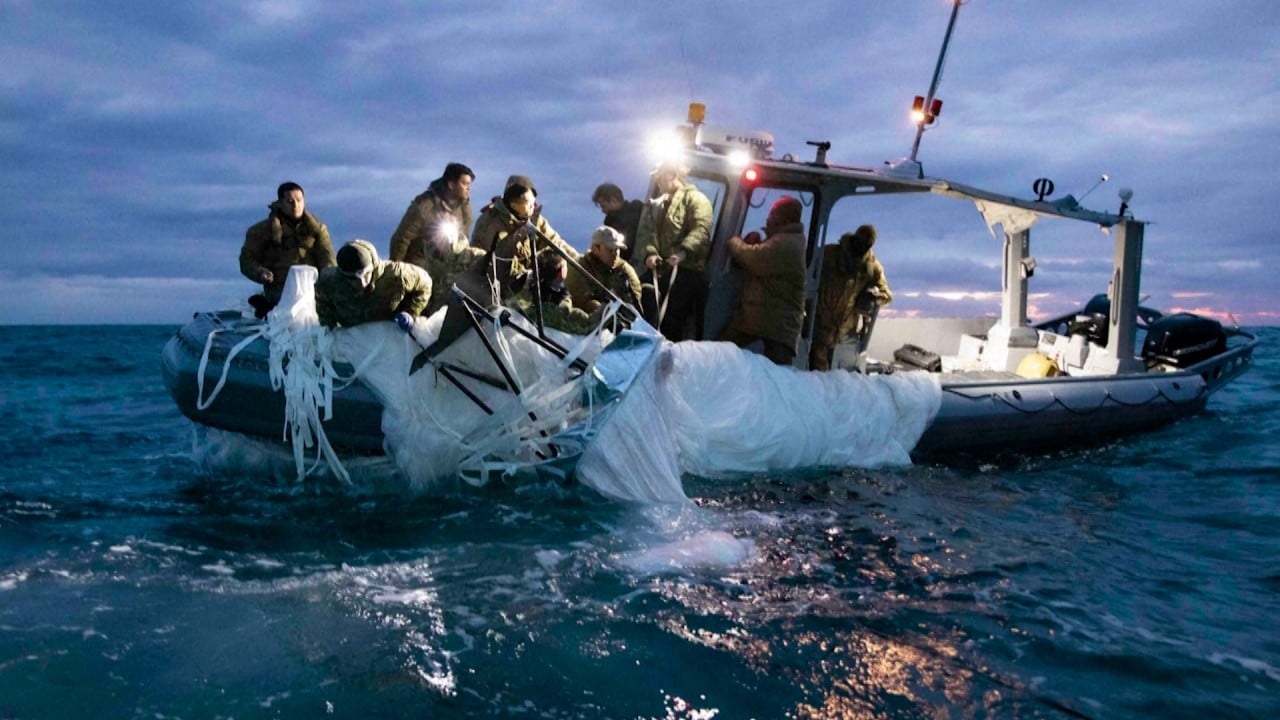
03:30
China says US balloons flew over Xinjiang, Tibet as diplomatic row deepens

China’s top diplomat dismissed the US decision to shoot down a Chinese balloon as “absurd and hysterical”, ramping up the rhetoric against Washington as Beijing seeks to defend its international reputation.
“It does not show America is strong. On the contrary, it shows the opposite,” Wang Yi told the Munich Security Conference in Germany on Saturday.
“Across the globe, there are many balloons in the sky, from different countries. Do you want to shoot down each and every one of them?”
Wary of its image overseas, China has stepped up its criticism of the United States over the past few days, particularly over the shooting down of a high-altitude balloon that Washington says was used for spying but that Beijing maintains was a stray weather research vessel.
In his address to the conference, Wang repeated China’s line that it told the United States that the unmanned airship was civilian in nature, with “limited self-steering capability and veered off course to enter the United States due to a westerly influence”.
He said shooting it down was “100 per cent abuse of force” and a violation of international practice.
“This is, I would say, absurd and hysterical,” Wang said, adding the “preposterous” moves by the US simply aimed to “divert attention from its domestic problems”.
He then broadened his criticism, saying that in seeing China as a geopolitical challenge, the US was “using all its means to clamp down and smear China, and is co-opting other countries to do the same”.
Wang, however, sidestepped a question raised by the moderator of the session, Munich Security Conference Foundation Council president Wolfgang Ischinger, on whether he would meet the US delegation in the German city.
US Secretary of State Antony Blinken cancelled a trip to China in early February over the balloon saga and there were reports that Wang and Blinken would meet in Munich.
The saga erupted early this month when a balloon was spotted over the continental United States in what Blinken called “a clear violation of US sovereignty”.
A US fighter jet shot down the balloon on February 4, with Washington claiming it was used for spying and Beijing saying it was to monitor the weather.
The Munich Security Conference is an annual event for discussion on global security issues. Representatives from 96 countries are attending this year.
On the sidelines of the conference on Friday, Wang told Pakistani Foreign Minister Bilawal Bhutto Zardari that “the Chinese civilian unmanned airship deviated from its course and entered the sky over the United States due to force majeure”.
According to state news agency Xinhua, Wang accused Washington of using the balloon incident to suit “domestic political needs”.
“This unexpected incident should have been handled calmly, rationally and professionally,” Xinhua said.
“But the US ignores basic facts, abuses force, overreacts, and plays up hype. This almost hysterical approach shows that the US’ prejudice and ignorance of China have reached an absurd level.”
On Friday, the Chinese embassy in Washington underlined Beijing’s position in an opinion piece in The Washington Post.
The balloon accidentally blew off course, caused “no real security threat” and its demise had hurt China-US relations, the article said.
“The overreaction by America – and its moves to heighten the issue – have exacerbated the situation,” it said.
“This isolated incident has caused new wounds in China-US relations.”
Oh Ei Sun, senior fellow at the Singapore Institute of International Affairs, said China hoped that a strong enough show of opposition would sway certain countries to its view.
Moderate but sometimes West-leaning nations such as Hungary, Poland and Turkey might take its side, he said, while traditional Chinese allies such as governments in Africa could feel a new wave of pro-China sympathy.
“When you shake the tree long enough, perhaps some of the branches will fall down, some of those eastern European ones, peripheral countries that might side with China, so you must loudly proclaim your innocence,” Oh said.
Victor Gao, vice-president of the Centre for China and Globalisation in Beijing, said China must impress its view on a global audience to “set the record straight” following US accusations of Chinese spying.
Beijing had reacted more mildly when the balloon first entered continental US airspace and expressed “regret” about its course.
“Other countries are calling China an aggressor,” Gao said. “But this incident is straightforward, and the US wants to blow this whole thing out of proportion.”